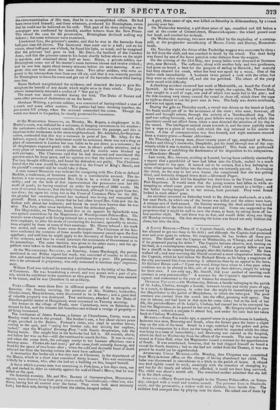At the MIDDLESEX SESSIONS, on Monday, Mr. Rogers, a shopkeeper
in St. Martin's-court, was indicted for a nuisance, in keeping caricatures in his window:
the caricatures collect a crowd outside, which obstructs the passage, and this is
injurious to the tradesmen in the same neighbourhood. Mr. Adolphus, for the prose- cution, contended that this was a nuisance in point of law. Mr. Alley, for the
defence, argued, that if the indictment could be sustained, there was not a shop or place of amusement in London but was liable to be put down as a nuisance ; for all shopkeepers exposed goods with the view to attract public attention, and at every place of amusement crowds collected, and the streets were blocked up with carriages. The Chairman said that he had discussed and considered the question much for forty years, and his opinion was that the indictment was good. The Jury thought differently, and found the defendant not guilty. The Chairman hinted that the case would be better decided in the Court of King's Bench, and the plaintiff's counsel said he would take it there.
A man named Mountain was indicted for conspiring with Mrs. Cole to defraud Macklin, a tradesman, of furniture goods to a 'considerable amount. The de- fendant, it was sworn, represented Mrs. Cole to be a widow lady of respect. ability; and on the faith of that representation the prosecutor sent her 20/. worth of goods, lie having received an order for upwards of 3001. worth. He soon discovered, however, that the lady's husband, although living apart from her,
was alive; for, upon his suing her in the Court of Common Pleas for the 201., she pleaded her coverture, proved her husband was living, and nonsuited the
plaintiff. Hunt, a witness, swore that he had often heard Mrs. Cole and the de- fendant talk about her husband ; and hence he must have known that he was alive. The Jury, after some hesitation, found the defendant guilty. The Magistrates, on Thursday, heard five or six appeals by Spitalfields wee- vers against convictions by the Magistrates at Worship-street Police-office. The weavers were charged with having entered into a conspiracy to force Mr. Moore, their employer, to alter his mode of conducting his business, agreeably to resolu- tions adopted by them at some of their meetings. Mr. Moore refused ; his work was sealed, and some of his looms were destroyed. The Chairman of the Ses- sions confirmed the sentence of three months imprisonment passed upon the first appellant; and told him he might apply to the Secretary of State for a remission of the sentence, and thus he would ascertain the sentiments of Government as to his proceedings. The same decision was given in the other cases ; and the ap- pellants were taken to the treadmill for the specified period.
At the WESTMINSTER SESSIONS, on Saturday, James Macdougal, the person mentioned in our Police report last week, was convicted of cruelty to his chil- dren, and sentenced to imprisonment and hard labour for a year. His paramour, who is far advanced in pregnancy, was only sentenced to fourteen days' imprison- ment.
William Ford was indicted for creating a disturbance in the lobby of the House of Commons. He was brandishing a sword, and was armed wiih a pair of pis- tols, which to exhibited to the members as they passed. The young man seemed to be insane, and he was (therefore ?) set at liberty.


















 Previous page
Previous page